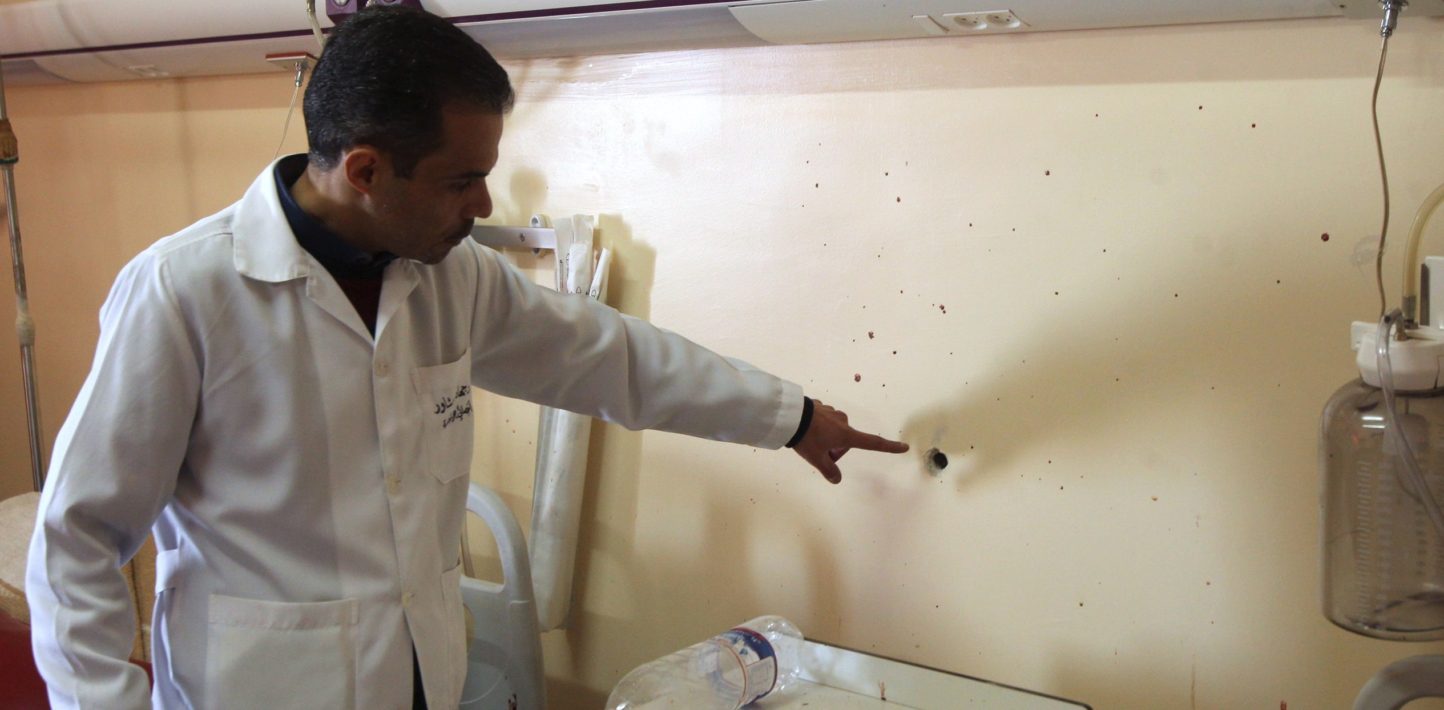The killing of a 28-year-old Palestinian man by Israeli forces during a raid on al-Ahli hospital in Hebron in the early hours of Thursday morning may amount to an extrajudicial execution, Amnesty International said today.
Eyewitnesses report that a large group of Israeli soldiers and police entered the hospital at 2.43am disguised as Palestinian civilians, with some wearing keffiyehs and fake beards and another being pushed in a wheelchair dressed as a pregnant woman. According to two witnesses Amnesty International spoke to, they entered a room on the third floor of the hospital where 20-year-old Azzam Azmi Shalaldah was a patient, to arrest him on suspicion of stabbing an Israeli civilian on 25 October.
When they entered the room where the patient was in bed, they immediately shot his cousin, Abdullah Azzam Shalaldah, at least three times, including in the head and upper body.
“The fact that Abdullah Shalaldah was shot in the head and upper body suggests this was an extrajudicial execution, adding to a disturbing pattern of similar recent incidents by Israeli forces in the West Bank which warrant urgent investigation,” said Philip Luther, Director of the Middle East and North Africa Programme at Amnesty International.
“Israeli forces must immediately cease their use of intentional lethal force against people who are not posing an imminent threat to life.”
The fact that Abdullah Shalaldah was shot in the head and upper body suggests this was an extrajudicial execution, adding to a disturbing pattern of similar recent incidents by Israeli forces in the West Bank which warrant urgent investigation
Philip Luther, Middle East and North Africa Director at Amnesty International
A witness said that Abdullah Shalaldah, who had been accompanying his cousin in the hospital and sleeping in the room, had gone to the bathroom and had just come out when Israeli forces burst into the room and shot him. The Israeli forces then threatened another patient at gunpoint, handcuffed another relative to a bed and then left the hospital with Azzam Shalaldah in a wheelchair.
Unlawful and deliberate killings carried out by order of government or military officials, or with their complicity or acquiescence, amount to extrajudicial executions, which are prohibited at all times and are crimes under international law.
The Israeli military released a statement saying that Abdullah Shalaldah had attacked Israeli forces, but did not specify whether he was armed. Witnesses report that he was not armed, was some metres away from the soldiers and police and had not attempted to attack them. There was no attempt to arrest Abdullah Shalaldah, according to the witnesses, or to use non-lethal alternatives before shooting him dead.
The killing of Abdullah Shalaldah is the latest in a pattern of killings by Israeli forces which Amnesty International considers to have been unlawful. Since the beginning of October there has been a dramatic increase in the number of attacks by Palestinians on Israeli civilians, soldiers and police. Attacks on civilians are never justified, but Israeli forces have responded with intentional lethal use of force in many cases where it was not warranted. The Israeli military’s own regulations allow soldiers in the occupied West Bank to open fire only when their lives are in imminent danger. It appears that this was not the case in the shooting of Abdullah Shalaldah, as he was unarmed.
Israeli forces have killed at least 18 Palestinians in and around the city of Hebron in recent weeks, including in cases that appear to be extrajudicial executions, and accordingly should be the subject of prompt, thorough and impartial investigations with a view to prosecution as criminal offences.
On 6 November Israeli forces shot and killed 72-year-old Tharwat al-Sharawi, alleging that she intended to ram them with her car. A video of the incident shows the car which she was driving heading towards the soldiers at a speed slow enough to allow the soldiers to jump out of the way and then begin shooting heavily at the car. Tharwat al-Sharawi’s son has said that his mother was on her way to lunch when she was killed. Amnesty International considers that even if Tharwat-al-Sharami did intend to carry out a ramming attack, the military has itself acknowledged that soldiers only began firing after jumping out of the way of the car. This means that the imminent danger had passed and accordingly that the use of lethal force was unlawful.
On 29 October Mahdi al-Muhtasib, 23, was shot by Israeli forces after reportedly lightly wounding an Israeli soldier in a stabbing attack in Hebron. Video of the aftermath of the incident shows Mahdi al-Muhtasib writhing in pain on the ground before an Israeli soldier, standing a distance of some metres away, shoots him again. The video shows that Mahdi al-Muhtasib was plainly wounded, and posed no threat whatsoever to the soldier. Moreover, shooting a wounded person is a wilful killing in grave breach of the Fourth Geneva Convention.
“Israeli forces have a long history of carrying out unlawful killings in the Occupied Palestinian Territories, including extrajudicial executions,” said Philip Luther.
“While the number of attacks by Palestinians on Israeli civilians, soldiers and police has increased significantly since the beginning of October, there is never any excuse for the Israeli military and police forces using lethal force where it is not warranted.”


